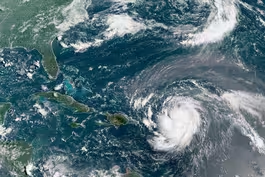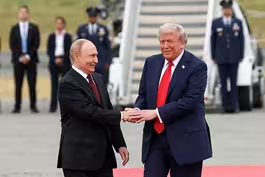
How revoking a key EPA regulation may hurt children’s health
Clip: 8/16/2025 | 5mVideo has Closed Captions
How a White House plan to overturn a key EPA regulation threatens children’s health
In July, the Trump administration proposed revoking a landmark 2009 finding that’s been the basis for EPA regulation of greenhouse gas emissions under the Clean Air Act. If the proposal is finalized, experts warn that it could jeopardize the health of millions of Americans, especially children. John Yang speaks with pediatrician and clinical professor Dr. Debra Hendrickson for more.
Problems playing video? | Closed Captioning Feedback
Problems playing video? | Closed Captioning Feedback
Major corporate funding for the PBS News Hour is provided by BDO, BNSF, Consumer Cellular, American Cruise Lines, and Raymond James. Funding for the PBS NewsHour Weekend is provided by...

How revoking a key EPA regulation may hurt children’s health
Clip: 8/16/2025 | 5mVideo has Closed Captions
In July, the Trump administration proposed revoking a landmark 2009 finding that’s been the basis for EPA regulation of greenhouse gas emissions under the Clean Air Act. If the proposal is finalized, experts warn that it could jeopardize the health of millions of Americans, especially children. John Yang speaks with pediatrician and clinical professor Dr. Debra Hendrickson for more.
Problems playing video? | Closed Captioning Feedback
How to Watch PBS News Hour
PBS News Hour is available to stream on pbs.org and the free PBS App, available on iPhone, Apple TV, Android TV, Android smartphones, Amazon Fire TV, Amazon Fire Tablet, Roku, Samsung Smart TV, and Vizio.
Providing Support for PBS.org
Learn Moreabout PBS online sponsorshipJOHN YANG: Last month, the Trump administration# proposed revoking the landmark 2009 scientific## finding, that's been the basis for EPA regulation# of greenhouse gas emissions under the Clean Air## Act.
If the proposal is finalized, it's# almost certain to be challenged in court.
And if the administration succeeds, experts# warn that it could jeopardize the health of## millions of Americans, especially children.# Pediatrician Debra Hendrickson is a clinical## professor at the University of Nevada# Medical School and the author of "The## Air They Breathe: A Pediatrician on# the Front Lines of Climate Change."
Dr. Hendrickson, what would be the# effect of revoking this finding on## the health of Americans, especially children?
DR. DEBRA HENDRICKSON, University of Nevada School# of Medicine: Well, if they revoke this finding,## it knocks out a major pillar in our fight# against the growing wildfires, rising heat## waves and worsening floods and hurricanes we've# been seeing for the past two decades.
And it makes## it more likely that all of these problems# will continue to get worse in the future.
And failing to stop this process,# to me, is a crime against children,## in my view, because not only are# they going to inherit the hotter,## more dangerous and more chaotic world that# we're creating, but they're already more## vulnerable to the growing health hazards# of that world.
We're already seeing that## things like worsening air pollution, rising# heat waves and the trauma of natural disasters.
And so we're losing many of the# gains we've had over the past## century infant mortality and# children's health and welfare.
JOHN YANG: Explain that.
You said children# are more vulnerable.
Explain that.
DEBRA HENDRICKSON: Yeah.
So there's a long list# of reasons why children are more vulnerable,## but particularly children under five.
And there's# three major reasons that we talk about most.
One is that their physiology is different.# That's the way their bodies work.
So we often## say in pediatrics that children are not just small# adults, and that's because you can't just take the## same calculations and assumptions you would# for an adult and apply them to a small child.
The second big reason is that they're# smaller in size.
And the third reason## is that their organs and body systems are still## developing and can be easily derailed# by pollutants and environmental harm.
So, for example, if a city is engulfed# in smoke, like my city, Reno, often is,## and a baby or toddler in that city is breathing# that smoke, they breathe faster than their## parents and they are taking in more air# pollution per pound of weight and.
And## their lungs and brain are still developing and# can be adversely affected by that pollution.
JOHN YANG: For your book, I know that you spoke# to a lot of young people about growing up in## areas with heavy pollution.
What did they tell# you?
What are the sorts of things they told you?
DEBRA HENDRICKSON: You know, in our# town, it causes a lot of distress## and mental health problems because we've# been encased in smoke sometimes for## eight to 10 weeks at a time.
In 2021,# there were two huge wildfires nearby.
And as the weeks wore on, you know, it's very hard# on everyone, mental health.
But a lot of kids,## I think adolescents I'm talking about,# primarily feel kind of betrayed that## nothing has been done about this problem# to help ensure a better future for them.
JOHN YANG: EPA Director Lee Zeldin,# when he announced this proposal,## said that the finding twisted the law,## ignored precedent, and warped science to achieve# their preferred ends.
What do you say to that?
DEBRA HENDRICKSON: I think that's exactly the# opposite of the truth.
I mean, I think that the## statement they released by the five scientists are# kind of known for being contrarians on this topic,## that if they reverse it is disregarding# the science, jeopardizing public health,## and is a direct contradiction to their mandate# to protect public health under the Clean Air Act.
JOHN YANG: Doctor, you practice in Reno, Nevada,# which is by some accounts the fastest warming## city in the United States.
What do you see# in your practice and the patients you see?
DEBRA HENDRICKSON: Yeah, so when we get engulfed# in smoke, it's called a smoke wave.
That'll come## over because we're 10 miles from the California# border.
So when the big fires hit California,## we're downwind, immediately downwind,# and we really get hit by it.
And the clinic and the hospital will fill# with kids wheezing and coughing.
You know,## we've had kids.
The pediatric ward will fill# up with kids on oxygen during heat waves,## which often go with, you know, we# usually have a heat wave before## the smoke hits because the heat# will trigger the fire to start.
We often see kids fainting in athletic# practices.
You know, there's been studies## showing that pediatric ER visits go up 17# percent when in hot weather, and smoke waves## also increase asthma visits by up to 78 percent,# according to one study of the Camp Fire in 2018.
So these events have a huge impact on# children's immediate health.
And because## they affect development, like I mentioned,# they can have a lifelong impact as well.
JOHN YANG: Dr. Debra Hendrickson# of the University of Nevada Medical## School, thank you very much.
DEBRA HENDRICKSON: Thank you.
How AI-generated models are shaking up the fashion industry
Video has Closed Captions
Clip: 8/16/2025 | 7m 49s | AI-generated models shake up the fashion industry and raise concerns (7m 49s)
News Wrap: Hurricane Erin strengthens into Category 5 storm
Video has Closed Captions
Clip: 8/16/2025 | 2m 20s | News Wrap: Hurricane Erin strengthens into Category 5 storm (2m 20s)
Security expert analyzes Trump’s new alignment with Putin
Video has Closed Captions
Clip: 8/16/2025 | 5m 58s | Security expert analyzes fallout of Trump’s alignment with Putin after their summit (5m 58s)
Providing Support for PBS.org
Learn Moreabout PBS online sponsorshipSupport for PBS provided by:
Major corporate funding for the PBS News Hour is provided by BDO, BNSF, Consumer Cellular, American Cruise Lines, and Raymond James. Funding for the PBS NewsHour Weekend is provided by...














